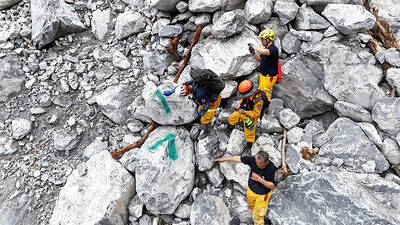Crews on deep-sea fishing boats that have anchored off other nations or engaged in improper interactions during the COVID-19 pandemic would be subject to a 14-day quarantine on their vessel when they return to Taiwan, effective immediately, a government official said.
Crew members of deep-sea fishing vessels and near-sea tuna fishing boats operating in waters between Taiwan and Japan, who are mostly migrant fishers, would be covered by the new regulation as part of the government’s efforts to prevent the spread of the novel coronavirus, Fisheries Agency Director-General Chang Chih-sheng (張致盛) said on Wednesday.
Deep-sea fishing vessels have been targeted because they spend more time operating in waters far from Taiwan, while tuna fishing boats have been included because a large number of Taiwanese ships are engaged in the trade as the peak season approaches, he said.
Vessels in the two categories that did not visit ports in other nations, did not interact with other ships, did not change their crew and were not inspected by foreign officials in the 30 days prior to their return to Taiwan are to be excluded from the measure, Chang said.
The crew members of such vessels would be allowed to enter Taiwan as long as they do not have a fever, cough or other COVID-19 symptoms when examined, he said.
As the agency traces the movements of all fishing boats operating on the high seas around the clock, it can determine whether they anchor off other nations or engage in any of the listed interactions, an agency official said.
There are 9,680 migrant workers — 7,526 from Indonesia, 1,436 from the Philippines, 690 from Vietnam and 28 from Thailand — employed on Taiwanese fishing vessels, agency data showed, a level similar to that of past years.
There are also 799 Chinese fishers working onboard Taiwanese vessels, the data showed.
New migrant workers scheduled to begin working on Taiwanese fishing vessels would undergo a 14-day quarantine upon arriving in Taiwan, as with all arriving foreign nationals, in line with Central Epidemic Commander Center regulations, Chang said.

Former president Ma Ying-jeou’s (馬英九) mention of Taiwan’s official name during a meeting with Chinese President Xi Jinping (習近平) on Wednesday was likely a deliberate political play, academics said. “As I see it, it was intentional,” National Chengchi University Graduate Institute of East Asian Studies professor Wang Hsin-hsien (王信賢) said of Ma’s initial use of the “Republic of China” (ROC) to refer to the wider concept of “the Chinese nation.” Ma quickly corrected himself, and his office later described his use of the two similar-sounding yet politically distinct terms as “purely a gaffe.” Given Ma was reading from a script, the supposed slipup

Former Czech Republic-based Taiwanese researcher Cheng Yu-chin (鄭宇欽) has been sentenced to seven years in prison on espionage-related charges, China’s Ministry of State Security announced yesterday. China said Cheng was a spy for Taiwan who “masqueraded as a professor” and that he was previously an assistant to former Cabinet secretary-general Cho Jung-tai (卓榮泰). President-elect William Lai (賴清德) on Wednesday last week announced Cho would be his premier when Lai is inaugurated next month. Today is China’s “National Security Education Day.” The Chinese ministry yesterday released a video online showing arrests over the past 10 years of people alleged to be

The bodies of two individuals were recovered and three additional bodies were discovered on the Shakadang Trail (砂卡礑) in Taroko National Park, eight days after the devastating earthquake in Hualien County, search-and-rescue personnel said. The rescuers reported that they retrieved the bodies of a man and a girl, suspected to be the father and daughter from the Yu (游) family, 500m from the entrance of the trail on Wednesday. The rescue team added that despite the discovery of the two bodies on Friday last week, they had been unable to retrieve them until Wednesday due to the heavy equipment needed to lift

THE HAWAII FACTOR: While a 1965 opinion said an attack on Hawaii would not trigger Article 5, the text of the treaty suggests the state is covered, the report says NATO could be drawn into a conflict in the Taiwan Strait if Chinese forces attacked the US mainland or Hawaii, a NATO Defense College report published on Monday says. The report, written by James Lee, an assistant research fellow at Academia Sinica’s Institute of European and American Studies, states that under certain conditions a Taiwan contingency could trigger Article 5 of NATO, under which an attack against any member of the alliance is considered an attack against all members, necessitating a response. Article 6 of the North Atlantic Treaty specifies that an armed attack in the territory of any member in Europe,